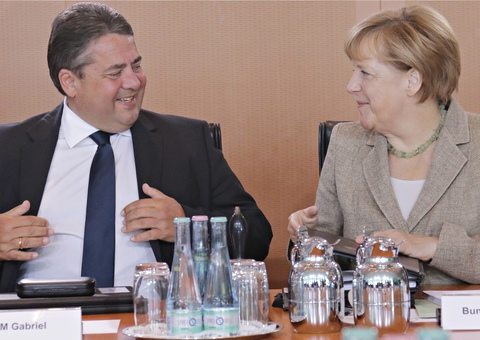Germany’s biggest neighbours are watching the formation of the country’s new government with a mixture of hope and fear, amid concerns that a fiscal hardliner hotly tipped to become the next finance minister could drag the continent back to the frosty standoffs of the eurozone crisis.
The Social Democratic party (SPD), the German Greens and the Free Democratic party (FDP) were expected to inch further towards a “traffic light” power-sharing deal on Friday, with formal coalition talks likely to start next week.
The next German chancellor under such an arrangement, the outgoing Social Democrat finance minister Olaf Scholz, is a popular figure with governments in Paris and Rome after parting with his country’s frugal stance during the pandemic. “Scholz is not an ideologue, he is a pragmatist, for contracting common debt in the Covid recovery plan,” said Stéphanie Yon-Courtin, a French MEP allied to Emmanuel Macron.
Yet it is the liberal politician expected to take over Scholz’s finance ministry who has, as German news magazine Focus put it, “half of Europe quaking in its boots”.
Christian Lindner, the leader of the FDP, as recently as four years ago called for Greece to be temporarily kicked out of the eurozone and dismissed Macron’s economic plans as turning the EU into a “Soviet Union-style system”.
In the winter of 2015-16, the 42-year-old’s dismissive view of one Germany’s biggest neighbours caused a minor diplomatic incident at a dinner he attended as a guest of honour in Berlin. According to one of the other diners present, Lindner said: “We cannot use the savings accounts of German workers to save the savings of the Italians.”
It was a jab that drew an icy response from Italy’s ambassador to Berlin. The Italian diplomat raised his hand and reminded Lindner that Italy had contributed to the Greek bailout funds, which had ultimately benefited French and German banks, tartly observing: “If I remember rightly it was the Italians who repaid German debts.”
France and Italy argue it is time to change the stability and growth pact, which sets strict limits on government borrowing. These fiscal rules, stating that budget deficits should not exceed 3% of GDP, were suspended at the start of the pandemic until the end of 2022.
The FDP has positioned itself in support of the eight northern European countries, including Austria, Denmark and the Netherlands, who would like the rules back in force when the pandemic suspension ends. In its manifesto, the party rejects the idea of introducing additional EU taxes as “incompatible with the European treaties”.
Whether the FDP will be as tough in government as it acted outside, however, is not a given.
While its MEPs sit in the same European parliament group as those on Macron’s list, the Free Democratic party has a distinctly German flavour: pro-business and anti-tax but broadly critical of US-style libertarianism, socially liberal but allergic to Keynesian government spending.
When the Free Democrats were last in a coalition with the Social Democrats from 1969 to 1982, they defined their role as the government’s fiscal watchdog. “A watchful eye on government debt and inflation rates is in the DNA of the FDP, and all prior German liberal parties,” said Karl-Heinz Paqué, the chair of the Friedrich Naumann Foundation for Freedom, an FDP-affiliated thinktank.
But during its last stint in government, the FDP, as junior partner to Merkel’s conservatives, found out the hard way that an inflexible stance on European economic affairs can also work to its disadvantage. At the end of a term marked by parliamentary squabbles over the eurozone crisis, its support fell by nearly 10 percentage points and the party dropped out of parliament.
“The two central reasons why the FDP suffered so much after going into government in 2009 to 2013 was that the party did not deliver any tax reform and descended into infighting over the unavoidable bailout programmes required to address the eurozone crisis,” said Paqué.
“Since then, the libertarian minority in the party has been pushed back.” Under Lindner, who took the reins as party leader three months after the 2013 defeat, Paqué said the FDP had become “more encompassing and pragmatic”.
The Free Democrats’ result at last month’s election was solid – 11.5% of the vote, a minor improvement on 2017 – but hardly a triumph, which is one reason the party has drawn increasing attention to its popularity among first-time voters. And while young FDP supporters are also concerned about intergeneration debt, they do not necessarily feel attached to the specific fiscal fetishes the party has clung on to in the past.
“We’re seeing that young Germans demand long-term sustainability from politics,” said Paqué. “But not all of them define sustainability in a purely ecological way like the Green party, but also more broadly, in a technological, social and economic sense. And those young voters are attracted to our philosophy.”
The FDP may have stated its intention to return the EU’s fiscal rules to their pre-pandemic setting, but even leading voices from Germany powerful business bodies and economic institutes have recently struck a different chord.
“The coming German government is being formed within a rapidly changing political debate,” said Christian Odendahl, chief economist at the Centre for European Reform thinktank. “Negative interest rates have diminished German fears of debt. Most importantly, the next government will be bound by law to meet specific climate targets.
“The FDP’s current promise is that these targets can be met with a cross-sector cap-and-trade programme. What they don’t yet say is such an approach will inevitably lead to rising carbon prices, which they don’t want either. Something will have to give.”
Odendahl said he expected the amount of necessary domestic investment identified by the next German government to set a benchmark for the rest of Europe.
“The expectation to act as a consensus seeker within Europe weighs on every German finance minister, whatever the party. We may find the finance ministry will shape Christian Lindner more than he will shape his office.”











